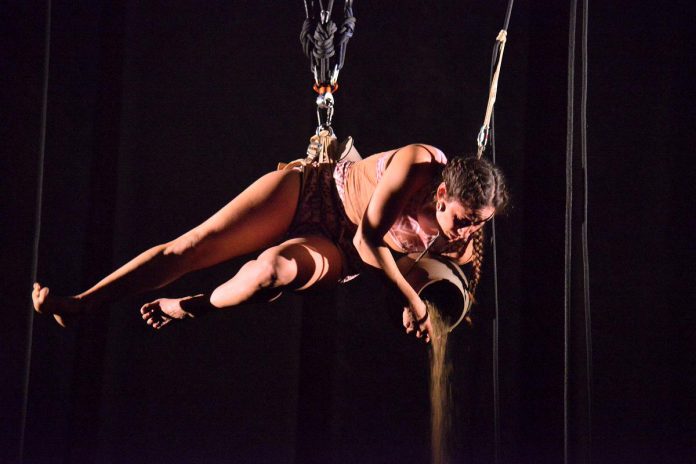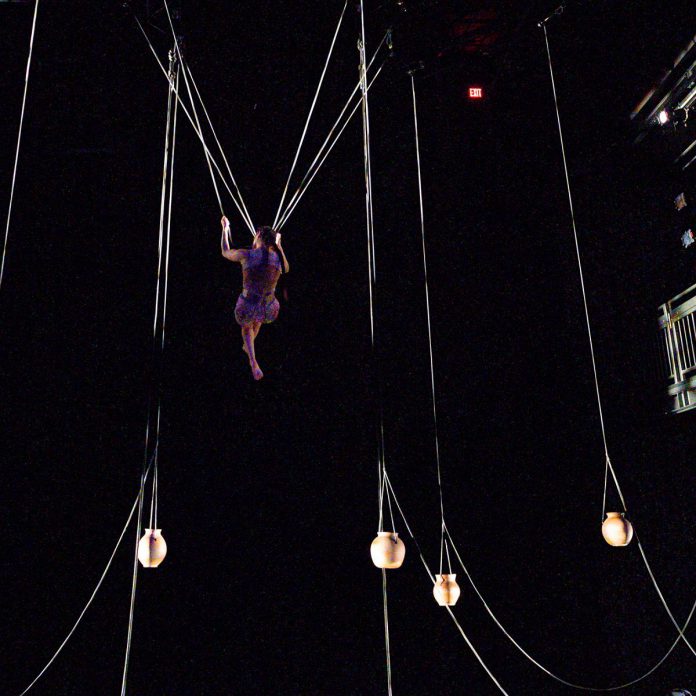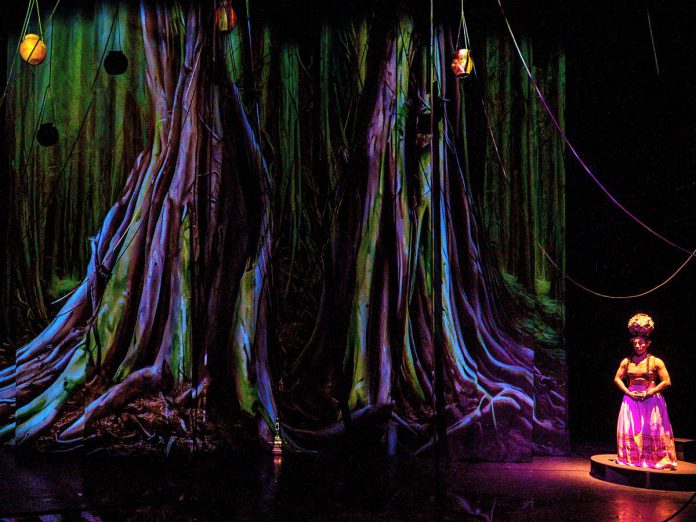
For the penultimate show of its 30th anniversary season, Public Energy Performing Arts is bringing internationally renowned aerial and performance artist Diana Lopez Soto to the Market Hall stage for one night only on Friday, April 5th for her exciting solo performance Nomada.
A Mexican-Canadian artist, Lopez Soto has drawn upon the stories and dances of her Mexican Indigenous ancestry to create a thrilling and powerful work that blends aerial dance, installation art, projection design, and contemporary Mexican Indigenous dance.
Nine years in the making, Nomada is inspired by connections to the land, rituals of water, cycles of sustainability, and stories that Lopez Soto collected in the highlands of Michoacán state in Mexico.
“Every element of creation and development has involved in-depth research and field work,” Lopez Soto explains. “This production is a restorative process and a gateway to connection — an experience that honours the stories of my family, our Otomi and Purépecha ancestry, (and) our contemporary community, history, and relationships to the land and culture of Michoacán.”
Lopez Soto has fully incorporated the elements of her research and field work into Nomada.
“Thanks to the support of knowledge keepers, my mother, and elders of the community of Michoacan, I was able to participate in water rituals and ceremonies, visited family members, butterfly sanctuaries, and bodies of water,” she says. “The sound and video material from rivers, storms, streets, conversations, and celebrations that we gathered during these years of research are crucial elements in the final sound composition and inspiration of movement.”
Nomada is supported by the CanDance Network commissioning program with five presenters across Canada taking part, including Peterborough’s Public Energy Performing Arts, Toronto’s Canadian Stage and Danceworks, Nanaim’s Crimson Coast Dance Society, and Vancouver’s PuSh International Performing Arts Festival. The performance premiered at PuSh from February 1 to 3, and will have its premiere in Toronto from April 18 to 20.

One of the most unusual aspects of Nomada is Lopez Soto’s use of numerous large clay pots called cantaros, which are used today in Mexico as percussion instruments (with water inside the cantaro being used to create different pitches).
In Nomada, the cantaros are filled with water, beans, corn, and soil and suspended around the stage, connected to each other and to Lopez Soto through a complex counterbalance system of ropes and pulleys. The vessels rise and fall in a choreographed vertical dance as Lopez Soto rises and falls with them, swinging dramatically from one side of the stage to the other.
Like so much of Nomada, the design of the cantaros used in the show has been a collaborative effort, first with Mexican ceramic artist Gustavo Bernal and then with Canadian ceramicist Cynthia Cupples, who lives near Lopez Soto’s organic farm in Uxbridge. The cantaros needed to be strong enough not only to be suspended by ropes, but also to withstand Lopez Soto’s full weight when she stands on them in one part of the performance.
According to a story by Charlie Smith published on the arts and culture website Pancouver in advance of Nomada’s premiere at PuSH, Lopez Soto originally called her performance Agua y Barro (“water and mud”) because she wanted to focus on clay, which Indigenous communities in Mexico relied on to make utensils for cooking and pots for carrying water. According to Lopez Soto, clay vessels were also used in ancestral times to transport loved ones who had passed away.
However, after Lopez Soto learned about her family’s stories of displacement, she changed the title of the performance to Nomada (“nomadic”), reflecting both her family’s experiences and her own personal story and artistic practice.
Lopez Soto immigrated to Canada on her own when she was only 17, and occasionally travels to Mexico and South America to be with her family and to collaborate with other artists.
VIDEO: “Nomada” promo
Lopez Soto’s Indigenous heritage plays a large role in Nomada, particularly when it comes to her Otomi heritage. While her father, who has Purépecha heritage, exposed her to the music, food, and cultural celebrations of the Purépechan people, her mother’s Otomi heritage was denied by the family.
For example, Lopez Soto’s uncle Aurelio told her the family had no Otomi heritage even though his mother, his grandparents, and his great-grandparents all spoke the language and lived in the Otomi community.
“Growing up in the community as an Otomi was not easy,” Lopez Soto tells Pancouver. “Many mothers would not teach their language to their kids or teach them about the culture. This was their way to protect their children and find survival.”
Nomada is a way for Lopez Soto and her family to reclaim their Otomi heritage and culture.
“We’re going back and actually owning that as an honour,” she says.
Lopez Soto will perform Nomada for one night only at 7:30 p.m. on Friday, April 5th at Market Hall Performing Arts Centre. Sold on a sliding pay-what-you-can scale from $10 to $50, tickets are available in person at the Market Hall box office (140 Charlotte St, Peterborough), by phone at 705-775-1503, or online at markethall.org.
For more information about Nomada and Diana Lopez Soto, visit publicenergy.ca/performance/nomada/.

kawarthaNOW is proud to be a long-time media sponsor of Public Energy Performing Arts.


























